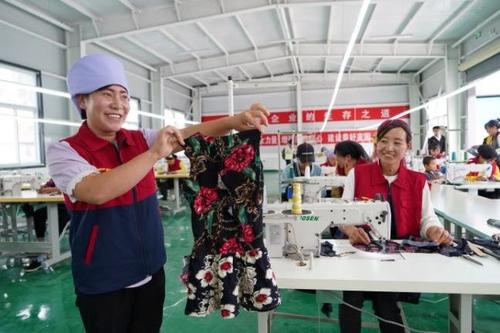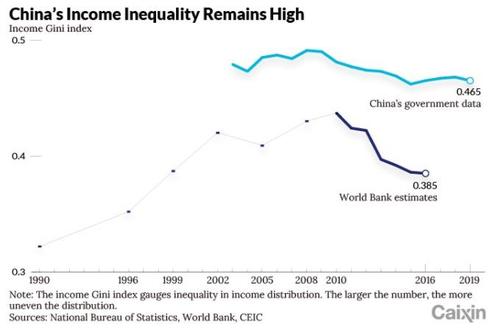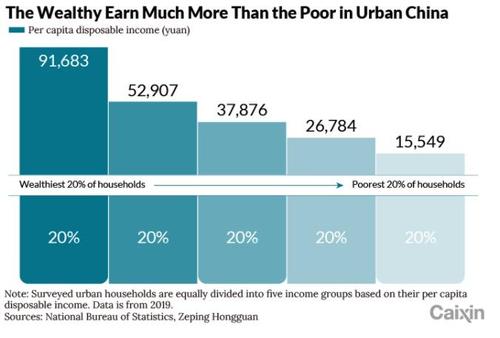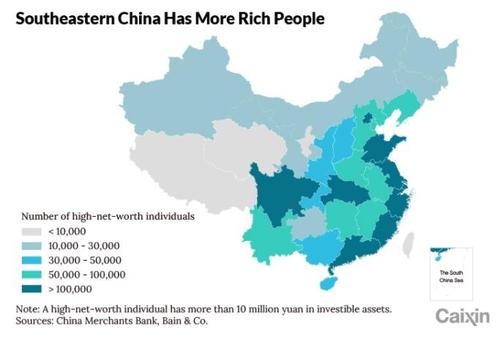Beijing Claims Its Plans To "Redistribute Wealth" Won't Involve "Killing The Rich"
Earlier this month, luxury goods stocks tumbled on reports that President Xi planned to shift the focus of a wide-ranging government crackdown on the economy and China's wealthiest businessmen (like Jack Ma, who briefly disappeared after criticizing China's regulations for allegedly "stifling innovation"). Instead of cracking down on a different industry, like video games, or private educational products, President Xi and the rest of the CCP's most-senior leaders said they were planning a good ol' fashioned "redistribution of wealth" to help "expand the middle class" and get rid of all these pesky billionaires (all of whom succeeded with at least the tacit support of the CCP).
Investors anxiously waiting for more details on the CCP's plans received another hint on Thursday, when Caixin, a Chinese state-controlled business media outlet, reported that President Xi had "stressed that common prosperity is an essential requirement of socialism" and called for "its advancement" while also "pursuing high-quality development" during the Aug. 17 meeting of the Central Committee for Financial and Economic Affairs.
Caixin also explained how the CCP is already implementing President Xi's vision for a more egalitarian (financially speaking, at least) society. The recent changes are related to school districts, after-school tutoring, property tax pilot programs and an expansion of anti-trust enforcement and other measures to tackle "reckless capitalism".
But for investors worried about the future of China's economy should President Xi reverse course and adopt more of the failed policies of Chairman Mao Zedong, another Chinese CCP official declared Thursday that this new drive for "common prosperity" doesn't mean "killing the rich to help the poor" (like the Communists tried to do during the Cultural Revolution).
China must also "guard against falling into the trap of welfarism," said Han Wenxiu, an economic regulator-bureaucrat.
Those who "get rich first" should help those behind, but hard work should be encouraged, he said.
"We cannot wait for help, rely on others for help, or beg for help. We cannot support layabouts."
As Reuters explains (for the socialism-loving Millennials and Zoomers who have no memory of the Communist era), market-economy-based reforms enacted by China four decades ago helped unleashed China's massive economic capacity and enabled the accumulation of vast personal wealth, with hundreds of billionaires minted in the still avowedly socialist country, deepening inequality, especially between urban and rural areas, but lifting hundreds of millions out of poverty at the same time.
Because of the rapid growth, China is facing a wealth inequality crisis not unlike the problems of inequality plaguing the US and Europe.
The high cost of urban living has contributed to a sharp slowdown in births, prompting China this year to allow families to have up to three children instead of two. Still, slowing economic growth and cutthroat competition have also prompted some young urbanites to embrace a passive attitude known as "lying flat".
One economist from a European investment bank said corporations would likely take a bigger role as China continues its push for greater equality.
"More big corporations are going to set up social responsibility funds if they have yet to do so, and the size of donations from them should increase," Iris Pang, chief economist for Greater China at ING, said in a note this week.
"Corporates need to take bigger steps to enhance their corporate governance and social responsibility. They need to work to get ahead of the regulators."
Certain provinces have also set goals for improving the average annual income for all residents by 2025.
Circling back to the Caixin report cited above, the lengthy text seeks to explain the "common prosperity" rooted in China's "top-level design and guiding policies and runs through the country's economic development trajectory."
After the Aug. 17 meeting, the CCP leadership decided to take a hands-off approach, leaving each area to decide its own path relevant to its specific conditions.
It also explained away how China's focus on efficiency has been a boon for its economy - but now needs to be brought back into balance.
Looking back at recent history, we can see a change of focus between efficiency and fairness. The absolute fairness in China before 1978 resulted in low efficiency and underdevelopment. Afterward, during the reform and opening up period, efficiency became the priority and a key theme of the time, with due consideration given to fairness. Efficiency relies on incentives. Those who make the pie bigger will get a larger share. The outcome we see today is 40 years of the remarkable economic boom that made China the second-largest economy in the world and its per-capita income has reached the level of upper middle-income countries.
However, during this process, rural-urban, regional and industrial gaps widened. The Gini coefficient also hit a record high.
Five factors have contributed to these increased disparities.
1. Systemic restrictions on the factor market — land, labor, etc. — have led to price distortion for production factors.
2. The development strategy that favored East China at the beginning of China’s reform and opening-up caused uneven regional capital allocation.
3. The GDP growth targets and tax-sharing system compelled local authorities to prioritize economic growth over people’s livelihood and capital over labor.
4. A flawed tax policy limited the effect of income redistribution.
5. An imperfect financial market failed to provide different income groups with equal access to credit.
An exploration of the conditions driving inequality quickly reveals that urban populations simply have more economic opportunity.
To correct this, it's critical to deepen the reform of the income distribution system and correctly handle the relationship between efficiency and equity.
These changes will start in southeastern China, which is sort of like China's Atlantic Coast (in the sense that it's where a large portion of the country's wealth is concentrated).
Beijing will encourage local authorities to to impose a consumption tax, and other measures, to siphon off more income from the wealthiest residents in the area and use that money to finance more services for more residents.
Sounds like a 'worker's paradise' to us...
https://ift.tt/2WuITNB
from ZeroHedge News https://ift.tt/2WuITNB
via IFTTT





0 comments
Post a Comment